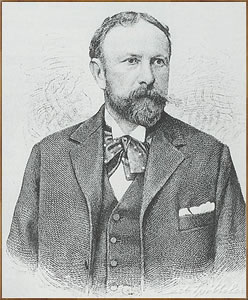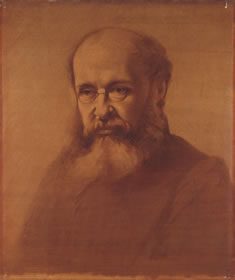De Nederlandse schrijver, essayist en criticus Frans Coenen werd in Amsterdam geboren op 24 april 1866. Zie ook mijn blog van 24 april 2007 en ook mijn blog van 24 april 2008.en ook mijn blog van 24 april 2009.
Uit: Bleeke levens
“….Een dier dagen kwam in het hôtel, dat levendig aan den grooten weg lag en dikwijls vroolijk weergalmde van jonge, driftige stemmen – heele zwermen jongelui, te voet of op rijwielen – een zonderling paar van een ouden heer en een jonge vrouw. De oude heer was lang en hoekigmager in zijn slof omhangende kleeren. Zijn beenig, grof gezicht met holle oogen onder borstelig-grijze wenkbrauwen, en grauwe bakkebaarden, die langs de vale wangen neergingen aan beide zijden van den paarschen, speekseligen lippenmond, had de somber-fatale uitdrukking van een ontvleeschden paardekop. De jonge vrouw met zuiver-ovaal gezichtje, donkere amandel-oogen, altijd neergeslagen onder zwarte wimpers, en glanzig zwart haar, was van een ideale zuidelijke schoonheid, een waar Odalisken-mooi. Zij kwam zeer eenvoudig gekleed, droeg altijd een hoed met een voile, die zij juist ver genoeg opsloeg om te kunnen eten.
Wij zagen hen het eerst bij tafel, om één uur. Zij wisselden maar enkele woorden met elkaar en spraken heel niet met anderen. Er was iets terruggetrokkens en schuws in hunne manieren en blikken, dat juist de aandacht op hen trok; en tot elkaar gebogen hoofden fluisterden gissingen en zagen hen van terzijde aan met snelle blikken. ‘Vader en dochter’ scheen niet aannemelijk, omdat zij zoo weinig op elkaar geleken, ‘man en vrouw’ was meer waarschijnlijk, maar het bleek moeilijk te ontdekken of onder de ringen, die de jonge vrouw aan haar kleine bruine handen droeg, ook een trouwring was. De een meende van ja, de ander van neen, en de nieuwsgierigheid werd er grooter van, telkens als zij weer voor een maaltijd binnentraden, met nietsziende blikken, zich haastig aan een leeg tafeleinde zettend. Het hôtelboek zou het ten slotte moeten uitwijzen, maar zij haastten zich niet met teekenen.
….Twee dagen later zouden wij vertrekken.”

Frans Coenen (24 april 1866 – 23 juni 1936)
De Amerikaanse schrijver en acteur Eric Bogosian werd geboren op 24 april 1953 in Woburn, Massachusetts. Zie ook mijn blog van 24 april 2009.
Uit: Perforated Heart
„Last night Leon dangled the carrot of a fancy literary award before my greedy snout and I, like the pig I am, lurched for it.
Arrived on time for the Humphrey, freshly shaved, in suit and tie, and joined the throng of hipster literati milling outside the ballroom. I was shown to a table near the back of the room. Not a good sign. An aging socialite stinking of chardonnay and Chanel No. 5 leaned in, “Are you a writer? I hope someone at this table is a writer!” I beamed as if we were sharing a witty joke. A salad adorned with flower petals was put in front of me. Wine was poured.
I spied Leon seated three tables closer to the front of the room. He waved. I nodded. He turned away. My own editor could not be bothered to come over to my table and say hello. Of course, Leon wanted me there because he can’t waste precious bucks promoting my new novel. No budget means there will be no display ads. No audio book. No parties given in my honor at Balthazar or the Four Seasons. All I will get is an abbreviated book tour (flying coach and residing at budget hotels). No NPR appearances. No magazine covers. If I’m lucky, I’ll get two or three guest lecture gigs at second-rate colleges. It’s all nickels and dimes to him.
At my table for eight, the chocolate mousse lay unforked and the decaf cooled as the jovial movie stars onstage speculated on the names of the winners present in the crowd (forgetting to mention me, of course). An honorary award was given out to a publisher of progressive children’s books. A eulogy was intoned for the CEO of a major media corporation who had died rock climbing a week earlier. And so the circus draggedon and on. Finally, a winner was announced.
Upon hearing a name, not my name, my neighbors dropped their eyes to inspect their silverware. At adjacent tables, heads turned to gauge my humiliation. An obese publicist to my right patted my hand in consolation. “I’m sure your book was much better, Richard.” His pupils dilated with the thrill of witnessing my pain.“

Eric Bogosian (Woburn, 24 april 1953)
De Duitse schrijver Michael Schaefer werd geboren op 24 april 1976 in Bielefeld. Al op jonge leeftijd schreef hij korte verhalen, meestal in het fantasy genre. In 1991 schreef hij zijn eerste complete roman die echter niet gepubliceerd werd. De roman had homosexualiteit als thema en Schaefer had zijn eigen coming out pas in 1994. In 2006 verscheen zijn debuutroman Liebe auf Raten, in 2008 volgde Touch me, Coach!, Onder het pseudoniem Eric Raven schrijft hij verder nog steeds fantasy verhalen als Krieger der Engel.
Uit: Love me,coach
„Louis zieht das Bein an den Oberkörper und blickt aus dem großen Fenster in die Nacht hinaus. Noch immer trägt er seinen Anzug. Eigentlich hätte er diesen schon längst ausgezogen. Spätestens dann, als Louis die aufgeregt wippenden, vollen Brüste von Rhiana berührte und sie zärtlich knetete … wäre zumindest seine Krawatte inklusive Hemd ein Opfer ihrer gemeinsamen Lust geworden. Er hätte aber spätestens nach dem zärtlichen Saugen ihrer Brustwarzen eine gierige Erregung spüren müssen! Doch nichts! Als Rhiana ihre Finger mit stöhnenden Lustlauten zu seiner Gürtelschnalle bewegte, sie öffnen wollte, legte er seine Hand auf ihre und zog sie zurück. Er konnte es nicht. Sein Verstand überschlug sich, sein Gewissen ackerte auf Hochtouren. In seinem Kopf waren immer die strahlenden Augen seines jungen Stars präsent. Evans Stimme durchfloss seinen Verstand. Die vielen Berührungen, die Schwärmereien … und zum guten Schluss, als Louis gewaltsam versuchte seine innere Stimme zum Schweigen zu bringen … Der Kuss in seinem Büro kurz nach der Regionalmeisterschaft! Evan hatte es geschafft, einen Kuss zu fabrizieren, der tatsächlich so schnell nicht in Louis’ Hirn bedeutungslos versickert war!”

Michael Schaefer (Bielefeld, 24 april 1976)
Bielefeld, oude raadhuis (Geen portret beschikbaar)
De Amerikaanse dichter en schrijver Robert Penn Warren werd geboren op 24 april 1905 in Guthrie, Kentucky. Zie ook mijn blog van 24 april 2007 en ook mijn blog van 24 april 2008 en ook mijn blog van 24 april 2009.
Uit:All the King’s Men
“To get there you follow Highway 58, going northeast out of the city, and it is a good highway and new. Or was new, that day we went up it. You look up the highway and it is straight for miles, coming at you, with the black line down the center coming at and at you, black and slick and tarry-shining against the white of the slab, and the heat dazzles up from the white slab so that only the black line is clear, coming at you with the whine of the tires, and if you don’t quit staring at that line and don’t take a few deep breaths and slap yourself hard on the back of the neck you’ll hypnotize yourself and you’ll come to just at the moment when the right front wheel hooks over into the black dirt shoulder off the slab, and you’ll try to jerk her back on but you can’t because the slab is high like a curb, and maybe you’ll try to reach to turn off the ignition just as she starts the dive. But you won’t make it, of course. Then a nigger chopping cotton a mile away, he’ll look up and see the little column of black smoke standing up above the vitriolic, arsenical green of the cotton rows, and up against the violent, metallic, throbbing blue of the sky, and he’ll say, “Lawd God, hit’s a-nudder one done done hit!” And the next nigger down the next row, he’ll say, “Lawd God,” and the first nigger will giggle, and the hoe will lift again and the blade will flash in the sun like a heliograph. Then a few days later the boys from the Highway Department will mark the spot with a little metal square on a metal rod stuck in the black dirt off the shoulder, the metal square painted white and on it in black a skull and crossbones. Later on love vine will climb up it, out of theweeds.
But if you wake up in time and don’t hook your wheel off the slab, you’ll go whipping on into the dazzle and now and then a car will come at you steady out of the dazzle and will pass you with a snatching sound as though God-Almighty had ripped a tin roof loose with his bare hands. Way off ahead of you, at the horizon where the cotton fields are blurred into the light, the slab will glitter and gleam like water, as though the road were flooded.”

Robert Penn Warren (24 april 1905 – 15 september 1989)
De Zwitser dichter, schrijver, essayist en criticus Carl Friedrich Georg Spitteler (eig. Carl Felix Tandem) werd geboren op 24 april 1845 in Liestal bij Basel. Zie ook mijn blog van 24 april 2007 en ook mijn blog van 24 april 2008 en ook mijn blog van 24 april 2009.
Zitronenfalter
I
Aufrechten Hauptes eine Jungfrau eifrig schrieb.
Da blitzt’ ein Maigewittersturm herein und trieb
Kastanienblüten streuend auf die nassen Blätter.
Und mitten in dem Blütensturm und Maienwetter
Ein gelb Oranien-Vögelein, im Todesbangen
Zitternd und sterbend, blieb an ihrem Finger hangen.
Da holte sie ein neu’ Papier mit sachter Hand,
Und auf den Tisch gebeugt, seitwärts das Haupt gewandt,
Mit feuchten Blicken und mit träumerischem Sinnen
Entschloß sie sich, ein ander Schreiben zu beginnen.
Also mit seinem Sterben ein Zitronenfalter
Erschmeichelte das Lebensglück dem Brieferhalter.
II
“Geh weg! du häßlich Gretchen! Was kommt dir in den Sinn,
So nah’ bei mir zu stehen, die ich so lieblich bin?”
So rief die schöne Stephie. – Da kam ein gelbes Ding
Von Schmetterling geflogen, den sie behende fing.
Das Gretchen trat daneben, vergessend ihren Zwist:
“Nicht wahr? du läßt ihn leben? – Da er so lieblich ist.”

Carl Spitteler (24 april 1845 – 29 december 1924)
De Australische schrijver Marcus Clarke werd geboren op 24 april 1846 in Londen. Zie ook mijn blog van 24 april 2009.
Uit: Australian Tales of the Bush
„POOR JOE. was the ostler at Coppinger’s, and they called him Poor Joe. Nobody knew whence he came; nobody knew what misery of early mutilation had been his. He had appeared one evening, a wandering swagman, unable to speak, and so explain his journey’s aim or end — able only to mutter and gesticulate, making signs that he was cold and hungry, and needed fire and food. The rough crowd in Coppinger’s bar looked on him kindly, having for him that sympathy which marked physical affliction commands in the rudest natures. Poor Joe needed all their sympathies: he was a dwarf, and dumb. Coppinger — bluff, blasphemous, and good-hearted soul — dispatched him, with many oaths, to the kitchen, and when the next morning the deformed creature volunteered in his strange sign-speech to do some work that might ” pay for his lodging,” sent him to help the ostler that ministered to King Cobb’s coach-horses. The ostler, for lack of a better name, perhaps, called him ” Joe,” and Coppinger, finding that the limping mute, though he could speak no word of human language, yet had a marvellous power of communication with horseflesh, installed him as under-ostler and stable-helper, with a seat at the social board, and a wisp of clean straw in King Cobb’s stable. ” I have taken him on,” said Coppinger, when the township cronies met the next night in the bar. “Who,” asked the croniest, bibulously disregarding grammar.’ ” Poor Joe,” said Coppinger. The sympathetic world of Bullocktown approved the epithet, and the deforme…“

Marcus Clarke (24 april 1846 – 2 augustus 1881)
De Engelse schrijver Anthony Trollope werd geboren in Londen op 24 april 1815. Zie ook mijn blog van 24 april 2009.
Uit: Cousin Henry
„Uncle Indefer “I have a conscience, my dear, on this matter,” said an old gentleman to a young lady, as the two were sitting in the breakfast parlour of a country house which looked down from the cliffs over the sea on the coast of Carmarthenshire. “And so have I, Uncle Indefer; and as my conscience is backed by my inclination, whereas yours is not–” “You think that I shall give way?” “I did not mean that.” “What then?” “If I could only make you understand how very strong is my inclination, or disinclination–how impossible to be conquered, then–” “What next?” “Then you would know that I could never give way, as you call it, and you would go to work with your own conscience to see whether it be imperative with you or not. You may be sure of this,–I shall never say a word to you in opposition to your conscience. If there be a word to be spoken it must come from yourself.” There was a long pause in the conversation, a silence for an hour, during which the girl went in and out of the room and settled herself down at her work. Then the old man went back abruptly to the subject they had discussed. “I shall obey my conscience.” “You ought to do so, Uncle Indefer. What should a man obey but his conscience?” “Though it will break my heart.” “No; no, no!” “And will ruin you.” “That is a flea’s bite. I can brave my ruin easily, but not your broken heart.” “Why should there be either, Isabel?” “Nay, sir; have you not said but now, because of our consciences? Not to save your heart from breaking,–though I think your heart is dearer to me than anything else in the world,–could I marry my cousin Henry. We must die together, both of us, you and I, or live broken-hearted, or what not, sooner than that. Would I not do anything possible at your bidding?” “I used to think so.” “But it is impossible for a young woman with a respect for herself such as I have to submit herself to a man that she loathes. Do as your conscience bids you with the old house. Shall I be less tender to you while you live because I shall have to leave the place when you are dead? Shall I accuse you of injustice or unkindness in my heart? Never! All that is only an outside circumstance to me, comparatively of little moment. But to be the wife of a man I despise!” Then she got up and left the room.”

Anthony Trollope (24 april 1815 – 6 december 1882)
Portret door Samuel Laurence
Zie voor nog meer schrijvers van de 24e april ook mijn vorige blog van vandaag.
